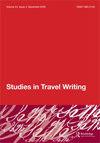在导游的陪伴下:澳大利亚原住民指南
Q2 Arts and Humanities
引用次数: 0
摘要
摘要本文研究了澳大利亚原住民旅游指南,主要关注原住民创作的文本。承认有大量作品批评旅行指南是压迫性文化话语的媒介,它既关注这些文本中固有的风险,也感兴趣它们作为作者和阅读场所的潜力,从而实现反殖民野心。有两个问题使讨论活跃起来。第一:土著指南在多大程度上符合对澳大利亚土著和非土著之间和解的传统理解?其次,这些文本如何以尊重原住民主权的方式影响旅游活动?尽管这篇文章没有对这两个问题提供明确的答案,但它还是对澳大利亚种族政治快速变化时期原住民撰写的指南所做的文化工作进行了考察。本文章由计算机程序翻译,如有差异,请以英文原文为准。
In the company of a guide: guidebooks to Indigenous Australia
ABSTRACT This article examines travel guidebooks to Indigenous Australia, focussing on predominantly Aboriginal-authored texts. Acknowledging the body of work that has critiqued travel guides as mediators of oppressive cultural discourses, it is as much concerned with the risks inherent in these texts, as it is interested in their potential as sites of authorship and reading that enable anti-colonial ambitions. Two questions animate the discussion. First: to what extent are Aboriginal guidebooks consistent with conventional understandings of reconciliation between Indigenous and non-Indigenous Australians? And second, how do these texts influence tourist activity in ways that respect Aboriginal sovereignty? While not providing a definitive answer to either of these questions, the article, nevertheless, opens up an examination of the cultural work performed by Aboriginal-authored guidebooks during a period of rapid change in the politics of race in Australia.
求助全文
通过发布文献求助,成功后即可免费获取论文全文。
去求助
来源期刊

Studies in Travel Writing
Arts and Humanities-Literature and Literary Theory
CiteScore
0.40
自引率
0.00%
发文量
13
期刊介绍:
Founded in 1997 by Tim Youngs, Studies in Travel Writing is an international, refereed journal dedicated to research on travel texts and to scholarly approaches to them. Unrestricted by period or region of study, the journal allows for specific contexts of travel writing to be established and for the application of a range of scholarly and critical approaches. It welcomes contributions from within, between or across academic disciplines; from senior scholars and from those at the start of their careers. It also publishes original interviews with travel writers, special themed issues, and book reviews.
 求助内容:
求助内容: 应助结果提醒方式:
应助结果提醒方式:


